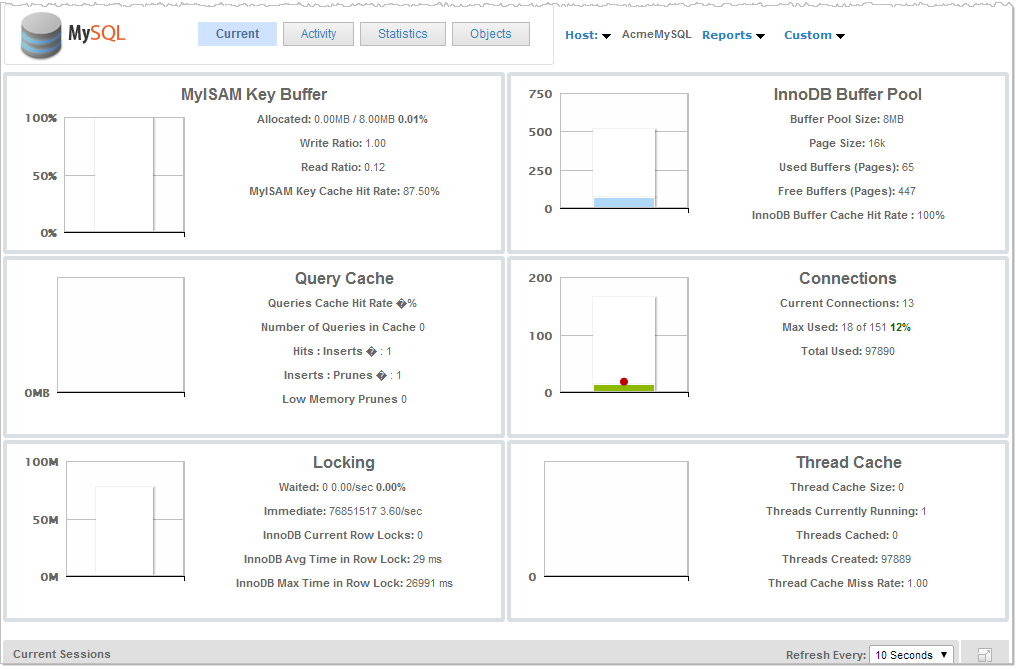| Appd tocbox |
|---|
On this page: Watch the video: | Appd noprint |
|---|
| iFrame |
|---|
| src | https://player.vimeo.com/video/109263532 |
|---|
| width | 375 |
|---|
| url | https://vimeo.com/109259328 |
|---|
| height | 211 |
|---|
| |
|
Database Performance Troubleshooting - 9:48 Direct Link: https://vimeo.com/109263532 |
The following are sample screenshots from an AppDynamics for Databases MySQL collector. They illustrate the type of information collected for this database platform.
MySQL Current Window
The MySQL % CPU statistics are available on the Current window include the SL
The MySQL explain plan shows how the MySQL optimizer has decided to run a SELECT statement and access the data. MySQL can only explain SELECT statements.
The command syntax for viewing the EXPLAIN output is:
| Code Block |
|---|
explain [select statement]
|
For example:
| Code Block |
|---|
explain select count(*) from statistics where id = 5
|
The AppDynamics for Databases window displays the explain output for this command:
 Image Removed
Image Removed
The columns in the Explain plan table are:
- id: The SELECT identifier. This is the sequential number of the SELECT within the query.
- select_type: The type of SELECT, which can be any of those shown in the following table:
SIMPLE | Simple SELECT (not using UNION or subqueries) |
PRIMARY | Outermost SELECT |
UNION | Second or later SELECT statement in a UNION |
DEPENDENT UNION | Second or later SELECT statement in a UNION, dependent on outer query |
UNION RESULT | Result of a UNION. |
SUBQUERY | First SELECT in subquery |
DEPENDENT SUBQUERY | First SELECT in subquery, dependent on outer query |
DERIVED | Derived table SELECT (subquery in FROM clause) |
- table: The table to which the row of output refers.
- possible_keys: The possible_keys column indicates which indexes MySQL can choose from use to find the rows in this table.
- Key: The key column indicates the key (index) that MySQL actually decided to use. The key is NULL if no index was chosen. To force MySQL to use or ignore an index listed in the possible_keys column, use FORCE INDEX, USE INDEX, or IGNORE INDEX in your query.
- key_len: The key_len column indicates the length of the key that MySQL decided to use. The length is NULL if the key column says NULL.
- ref: The ref column shows which columns or constants are compared to the index named in the key column to select rows from the table.
- rows: The rows column indicates the number of rows MySQL believes it must examine to execute the query.
- Extra: This column contains additional information about how MySQL resolves the query.
MySQL Activity Window
MySQL Statistics Window
when the Host Collector is enabled for the database collector. You can choose to monitor the host system when you setup the database collector.
 Image Added
Image Added
MySQL Activity Window
 Image Added
Image Added
MySQL Statistics Window
 Image Added
Image Added
MySQL Objects Window
MySQL Objects Databases Window
 Image Added
Image Added
MySQL Objects Users Window
 Image Added
Image Added
MySQL Objects Variables Window
 Image Added
Image Added
MySQL Objects Change Window
 Image Added
Image Added
MySQL Objects Storage Window
 Image Added
Image Added
MySQL Objects Error Log Window
 Image Added
Image Added
...